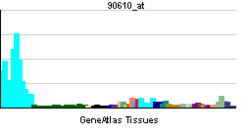LRCH4
| LRCH4 | |||||||||||||||||
|---|---|---|---|---|---|---|---|---|---|---|---|---|---|---|---|---|---|
| Identifiers | |||||||||||||||||
| Aliases | LRCH4, LRN, LRRN1, LRRN4, PP14183, leucine-rich repeats and calponin homology (CH) domain containing 4, leucine rich repeats and calponin homology domain containing 4 | ||||||||||||||||
| External IDs | MGI: 1917193 HomoloGene: 20532 GeneCards: LRCH4 | ||||||||||||||||
| |||||||||||||||||
| RNA expression pattern | |||||||||||||||||
   | |||||||||||||||||
| More reference expression data | |||||||||||||||||
| Orthologs | |||||||||||||||||
| Species | Human | Mouse | |||||||||||||||
| Entrez | |||||||||||||||||
| Ensembl | |||||||||||||||||
| UniProt | |||||||||||||||||
| RefSeq (mRNA) | |||||||||||||||||
| RefSeq (protein) | |||||||||||||||||
| Location (UCSC) | Chr 7: 100.57 – 100.59 Mb | Chr 5: 137.63 – 137.64 Mb | |||||||||||||||
| PubMed search | [1] | [2] | |||||||||||||||
| Wikidata | |||||||||||||||||
| View/Edit Human | View/Edit Mouse |
Leucine-rich repeat and calponin homology domain-containing protein 4 is a protein that in humans is encoded by the LRCH4 gene.[3][4]
This gene encodes a protein that contains leucine-rich repeats (LRR) at its amino terminus and that is known to be involved in ligand binding. The carboxyl terminus may act as a membrane anchor. Identified structural elements suggest that the encoded protein resembles a receptor.[4]
References
- ↑ "Human PubMed Reference:".
- ↑ "Mouse PubMed Reference:".
- ↑ Glockner G, Scherer S, Schattevoy R, Boright A, Weber J, Tsui LC, Rosenthal A (Dec 1998). "Large-Scale Sequencing of Two Regions in Human Chromosome 7q22: Analysis of 650 kb of Genomic Sequence around the EPO and CUTL1 Loci Reveals 17 Genes". Genome Res. 8 (10): 1060–73. doi:10.1101/gr.8.10.1060. PMC 310788
 . PMID 9799793.
. PMID 9799793. - 1 2 "Entrez Gene: LRCH4 leucine-rich repeats and calponin homology (CH) domain containing 4".
Further reading
- Olsen JV, Blagoev B, Gnad F, et al. (2006). "Global, in vivo, and site-specific phosphorylation dynamics in signaling networks". Cell. 127 (3): 635–48. doi:10.1016/j.cell.2006.09.026. PMID 17081983.
- Shiio Y, Rose DW, Aur R, et al. (2006). "Identification and Characterization of SAP25, a Novel Component of the mSin3 Corepressor Complex". Mol. Cell. Biol. 26 (4): 1386–97. doi:10.1128/MCB.26.4.1386-1397.2006. PMC 1367179
 . PMID 16449650.
. PMID 16449650. - Rual JF, Venkatesan K, Hao T, et al. (2005). "Towards a proteome-scale map of the human protein-protein interaction network". Nature. 437 (7062): 1173–8. doi:10.1038/nature04209. PMID 16189514.
- Gerhard DS, Wagner L, Feingold EA, et al. (2004). "The Status, Quality, and Expansion of the NIH Full-Length cDNA Project: The Mammalian Gene Collection (MGC)". Genome Res. 14 (10B): 2121–7. doi:10.1101/gr.2596504. PMC 528928
 . PMID 15489334.
. PMID 15489334. - Ota T, Suzuki Y, Nishikawa T, et al. (2004). "Complete sequencing and characterization of 21,243 full-length human cDNAs". Nat. Genet. 36 (1): 40–5. doi:10.1038/ng1285. PMID 14702039.
- Scherer SW, Cheung J, MacDonald JR, et al. (2003). "Human Chromosome 7: DNA Sequence and Biology". Science. 300 (5620): 767–72. doi:10.1126/science.1083423. PMC 2882961
 . PMID 12690205.
. PMID 12690205. - Strausberg RL, Feingold EA, Grouse LH, et al. (2003). "Generation and initial analysis of more than 15,000 full-length human and mouse cDNA sequences". Proc. Natl. Acad. Sci. U.S.A. 99 (26): 16899–903. doi:10.1073/pnas.242603899. PMC 139241
 . PMID 12477932.
. PMID 12477932.
This article is issued from Wikipedia - version of the 6/1/2016. The text is available under the Creative Commons Attribution/Share Alike but additional terms may apply for the media files.